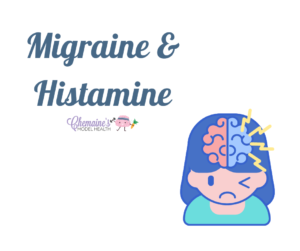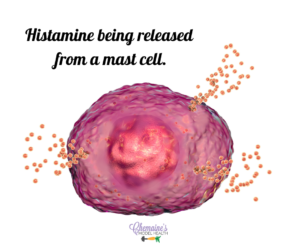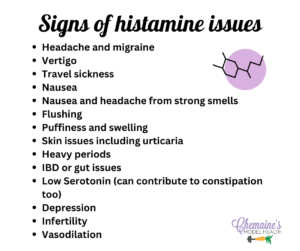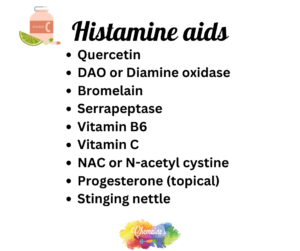Histamine is a bigger deal then people realize. Its estimated that most of the population is dealing with some sort of histamine issue. And mostly middle aged. When we see these histamine issues, it is known as a “histamine intolerance”, which many conventional doctors are unfortunately not well versed in, so they don’t know what to look for or test for when a patient walks in with certain symptoms.
Common Symptoms of Histamine Intolerance (there are lots more though);
- Headaches
- Dizziness and vertigo
- Rapid heartbeat
- Weak muscle tone
- Sudden low blood pressure/cardiac collapse
- Itchy and flushing skin
- Hives and rash
- Eczema
- Swelling and puffiness
- Nasal drip
- Nasal congestion and irritation
- Sneezing and shortness of breath
- Bloating and gas
- A feeling of ‘fullness’
- Diarrhea
- Abdominal pain
- Constipation
- Nausea and vomiting
- Travel or motion sickness
- PMS and menstrual cycle issues
- Insomnia
- Brain fog
- Tinnitus
- Joint pain
- breast tenderness
This study proposes that histamine issues originate in the gut, which would make sense if your not detoxifying properly or having gut issues, which most people do. This would also be due to a lack of DAO enzyme “and therefore, the food component histamine not being degraded and/or absorbed properly within the GI tract.”
 So what about histamine and MIGRAINE? Specifically migraine that many women experience with PMS or before out menses?
So what about histamine and MIGRAINE? Specifically migraine that many women experience with PMS or before out menses?
Histamine symptoms are actually more common in women because of our hormones, and often track with the menstrual cycle, occurring when estrogen is high at ovulation and then again just before the period AKA PMS.
- Estrogen stimulates mast cells to release histamine and down-regulates the DAO enzyme that clears histamine. While, histamine stimulates the ovaries to make more estrogen. The net result can be a vicious cycle of estrogen → histamine → estrogen → histamine.
- Progesterone stabilizes mast cells, up-regulates DAO, and can therefore reduce histamine… but most women have issues with low progesterone due to chronic stress. So of course are not metabolizing and detoxifying histamine efficiently.
- It is proposed that symptoms of estrogen dominance are actually symptoms of high estrogen.
Several symptoms on the symptoms list above are typical symptoms of PMS which makes sense because histamine rises and falls with estrogen. Histamine is highest just before ovulation and then again during the days before the period. Histamine can also cause period pain because of its inflammatory effect.
So what are some aids that can help us get 𝙃𝙞𝙨𝙩𝙖𝙢𝙞𝙣𝙚 𝙊𝙪𝙩?
Along with the food changes we may need to make and supporting metabolism and detoxification…
Histmine food reference list SIGHI-Leaflet_HistamineEliminationDiet
I hope you found this helpful and please reach out if you have any questions! We could go int a lot more detail but I think this is enough for the majority to understand and prevent overwhelm. Let me know if you try an antihistamine the next time you have a migraine or travel sickness too… does it help?
Best regards always,




